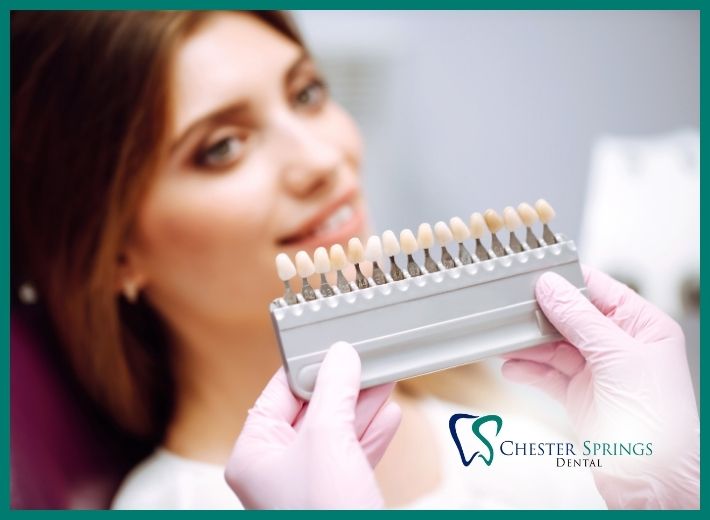Tooth pain and toothaches can occur for various reasons, but the common denominator is that dealing with the pain is not fun! Whether the discomfort builds or happens suddenly, tolerating the pain for long is not an option! An appointment with an experienced, friendly, and genuinely caring clinic like Chester Springs Dental should be the priority! This insightful overview of toothaches will help provide an understanding of several reasons why teeth may hurt. And if you have questions, we are always here!
Why Does My Tooth Hurt?
Whether it’s sharp and sudden or dull and constant, tooth pain is hard to ignore. A toothache or tooth pain is caused when the nerve in the root of a tooth or surrounding a tooth is irritated. Dental (tooth) infection, decay, injury, or loss of a tooth are the most common causes of dental pain. Pain may also occur after an extraction (when a tooth is pulled out). Pain sometimes comes from other areas and goes to the jaw, thus appearing to be tooth pain. The most common areas include the jaw joint (temporomandibular joint, or TMJ), ear, sinuses, and even occasionally from heart problems.
Bacteria growing inside your mouth can contribute to gum disease and dental decay, both of which can cause pain. Often, gum disease will not result in any pain.
You can prevent most dental problems by flossing, brushing with fluoride toothpaste, and having your teeth professionally cleaned twice a year. The dentist may apply sealants and fluoride, which are especially important for children’s teeth.
Toothache Causes
Toothache occurs from inflammation of the central portion of the tooth called pulp. The pulp contains nerve endings that are very sensitive to pain. Inflammation of the pulp, or pulpitis, may be caused by dental cavities, trauma, and infection. Referred pain from the jaw may cause you to have symptoms of a toothache. The first step toward relief is to find out what’s wrong. A toothache may require a trip to the dentist.
Could It Be Sensitive Teeth?
If your teeth are healthy, a hard outer layer of enamel covers them to protect the nerves inside. The enamel can wear away over time. When the middle layer of your tooth is exposed, anything you eat or drink can reach your nerve endings.
Gum disease can make your teeth sensitive. Your gums shrink away from your teeth, and that exposes the roots. You also can damage your gums if you brush too hard.
A recent cleaning or a new filling may make you sensitive for a few weeks. Many people feel it after whitening treatments. An old filling that’s loose or damaged can cause it, too.
Could It Be a Damaged Tooth?
Your teeth come under attack every time you eat. Bacteria cling to them until you brush them away. They produce acid, which makes the holes in your enamel called cavities.
Or you could have a crack in a tooth that’s exposed the sensitive inner layers. Maybe you bit down on a cherry pit or were hit in the face during softball.
A cavity or a crack can cause sharp pain and make your mouth sensitive when you bite down. The longer the pain lingers, the more serious the damage is likely to be.
If it’s deep enough, a cavity or crack can let bacteria into the inner layer, called pulp, of your tooth. The pulp can become infected, and that can lead to a buildup of pus called an abscess. The infection can spread to tissue and bone, too.
Do You Grind Your Teeth?
This is a common problem brought on by stress, sleep disorders, or a bite issue. If you grind your teeth while you sleep, it can wear away your enamel and even cause a crack.
Could It Be Your Wisdom Teeth?
Teething hurts whether you’re a baby or an adult. You’re likely to feel it when your wisdom teeth start to push through your gums. Food can get stuck under the gum and cause decay and infection.
Could the Problem Be Outside Your Mouth?
Your teeth may hurt because of an issue somewhere else in your body. That’s called referred pain. It can come from:
- Certain kinds of headaches, like cluster and migraine
- Clogged or infected sinuses
- Problems in the joint or muscles that connect your jaw to your skull
In rare cases, a heart attack can cause tooth pain. It’s also a symptom of certain nerve diseases.
Toothache Symptoms
Toothache and jaw pain are common complaints. There may be severe pain from pressure, or from hot or cold stimuli. The pain may last for longer than 15 seconds after the stimulus is removed. As the area of inflammation increases, the pain becomes more severe. It may spread to the cheek, the ear, or the jaw. Other signs and symptoms that may lead you to seek care include the following:
- Pain with chewing in your teeth or jaw
- Headaches
- Your teeth are sensitive to heat or cold. You’ll feel a couple of seconds of pain when something hot or cold hits them. Sweet or acidic foods may bother you, too.
- Bleeding or discharge from around a tooth or gums
- Swelling around a tooth or swelling of your jaw
- Injury or trauma to the area
- Bad breath
- Fever
- Bad taste in your mouth
- Swollen glands
These signs and symptoms may sometimes be linked to dental decay, tooth fracture, or gum disease (periodontal disease). Dental decay or an area of redness around the tooth’s gum line may point to the source of pain. If you tap an infected tooth, it may make the pain more intense. This sign may point to the problem tooth even if the tooth appears normal.
When to Seek Medical Care for a Toothache
Don’t put off a trip to the dentist if your teeth hurt. Cavities and cracks get worse over time. You should call your doctor or dentist about a toothache when:
- Pain is not relieved by over-the-counter drugs
- You have severe pain after a tooth is pulled; this may occur on the second or third day after tooth extraction. This is a result of the clot falling out and bone exposed until a new clot can cover the exposed bone. The condition is known as alveolar osteitis or “dry socket syndrome.” If you develop this condition, you should see a dentist within 24 hours.
- Pain is linked to swelling of the gums or face, or you have discharge around a tooth; fever is an important sign of infection in dental disease. Simple dental decay (caries) does not cause fever. These signs may mean there’s an infection surrounding the tooth, the gum, or the jawbone (mandible). Fever and swelling may be signs of an abscess. Dental abscesses may require antibiotics and surgical opening (drainage) of the abscess. When this procedure is recommended to be done inside the tooth (endodontic drainage), “root canal” therapy is performed.
- Broken or knocked out teeth occur from an injury; unless associated with more severe injuries, your dentist should be contacted as soon as possible. Swallowed teeth and permanent tooth loss are considered dental emergencies. Tooth loss due to injury (traumatic loss) is treated differently in children who have lost their primary teeth than in older children and adults with injury to their secondary – or permanent – teeth. If a child’s permanent (adult) tooth is fully knocked out, try to gently rinse it off and re-implant it as soon as possible and seek dental care. If you are not able to get it back in, put it in a small amount of milk or even water and seek dental care.
- Pain is present at the angle of your jaw; if every time you open your mouth widely you have pain, it is likely that the TMJ has been injured or inflamed. This can occur from an injury or just by trying to eat something that is too big. Your dentist may be able to suggest solutions to this problem.
- Wisdom teeth are causing pain; as wisdom teeth (third molars) are coming into the mouth – or erupting – they cause inflammation of the gum around the visible portion of the crown. The gum overlying the crown may become infected. The tooth most commonly involved is the lower third molar. The pain may extend to the jaw and ear. There may be swelling in the affected area so that the jaw cannot be closed properly. In severe cases, pain in the throat and the floor of the mouth may make it difficult to swallow.
- High fever or chills: This may indicate a more widespread infection that might require more than antibiotics by mouth.
- Recent head or face injury: If you have a headache, lightheadedness, nausea, vomiting, or other symptoms that concern you after an injury to your face or mouth, you may have a more serious injury in addition to your dental injury.
- A facial rash linked to a toothache: This condition may improve with medication. The doctor should be able to decide what is appropriate.
- Any jaw pain that comes with chest pain: Although jaw pain is most commonly caused by dental disease, it is sometimes referred pain from other areas. People with heart disease, especially people who have had stents placed, people with diabetes, or those who have had heart surgery, may have jaw pain as a symptom of a heart attack or angina. If your jaw or tooth pain is comes with lightheadedness, sweating, or shortness of breath, you should see a doctor.
- Trouble swallowing or excessive pain or bleeding from gums: If you have a history of a weakened immune system, diabetes, or steroid use, you may be more likely to get infections. Infections can often be more severe and extensive or caused by unusual organisms. Dental and gum infections in people with these conditions may require more aggressive treatment. An abscess may need draining or IV antibiotics, for example.
Exams and Tests for Toothaches
A thorough medical history and oral exam usually lead to the right diagnosis.
Sometimes, X-rays called periapical and Panorex views (panoramic X-rays of the teeth and jaw) are taken. Rarely, lab evaluation, including EKG tracings of the heart, will assist the doctor. If the cause is something other than a dental or jaw problem, the doctor may prescribe drugs directed at the problem. If the condition is more severe, the doctor may admit you to the hospital for further care. You may be referred to a dentist for further treatment.
Treating a Toothache at Home
For toothaches:
- Over-the-counter pain medications such as acetaminophen or ibuprofen may be used. Take these as directed on the package while you arrange a dental appointment.
- Avoid very cold or hot foods, because they may make the pain worse.
- You may get relief from biting on a cotton ball soaked in oil of cloves. You can get oil of cloves at most drugstores.
- Special toothpastes can make your teeth less sensitive. And you can reverse early gum disease when you brush and floss correctly.
For jaw pain:
- Aspirin may be helpful for problems in the joint of the jaw in adults.
- Acetaminophen (not aspirin) should be used for children and teenagers.
- If pain happens every time you open your mouth widely, the temporomandibular joint (TMJ) may be the source of the pain. Yawning or taking a large bite of food may worsen the pain. An appointment with your doctor or dentist will help you find the cause.
Medical Treatment for Toothaches
In most cases, toothaches or jaw pain signifies a problem that must be cared for by a dentist.
A referral to a dentist for follow-up will usually be arranged. In some cases, the doctor may try a shot around the tooth for pain control. If there is swelling in the gums or face, or if you have a fever, antibiotics may be prescribed.
- At the dentist’s office, fillings, pulling teeth, or other procedures may be performed as required. A tooth extraction will be the most likely procedure with a primary (baby) tooth. On permanent teeth, if the problem is severe, root canal therapy (cleaning out the nerves and blood vessels and sealing off the root canals of the tooth) and crown procedures are generally performed.
- An antibiotic will usually be prescribed if a fever or swelling of the jaw is present. Such procedures are generally done in stages, with pain and infection being cared for right away and reconstructive procedures being performed at a later time (weeks to months). You will be able to return to work or school while you recover. Dentists and oral surgeons may plan other procedures at the most appropriate time.
- If causes other than the teeth or jaw are responsible for the pain, management will depend on the condition.
Toothache Treatment Follow-Up
After toothache treatment at your dentist’s office, continue to practice good dental care. Routine and prompt follow-up appointments with the dentist should relieve your dental pain faster.
When you leave the emergency department, take the medications as prescribed and keep your follow-up appointment. If you have any concerning signs or symptoms, call your doctor.
Stopping smoking may help improve some dental conditions. If you are having trouble quitting, talk to your doctor about assistance.
Toothache Prevention
Most people can avoid toothaches and severe dental problems with regular dental care. Have your dentist’s telephone number easily available in case of an emergency.
- Maintain a healthy diet. Bacteria thrive on refined sugar and starch and need this in order to burrow through the enamel on your teeth. Watch what you eat, and be careful about food that sticks to and between your teeth. Brush your teeth after eating.
- Establish a good program of cleaning your teeth to remove food particles. Brush your teeth after eating, and brush your gums to encourage gum health. Use a soft toothbrush with fluoride toothpaste as recommended by the American Dental Association. Floss between teeth daily. Water jets are effective at removing trapped particles, but flossing your teeth does a more thorough job when done carefully. Rinse daily with an antiseptic mouthwash to help get rid of bacteria that cause plaque and early gum disease.
- Prevent tooth decay with fluoride. Fluoride is effective in preventing tooth decay in children. Fluoride is a natural element and is found in many water supplies and vegetables. Check and see if your tap water is fluoridated. If your water is not fluoridated, your dentist can prescribe fluoride tablets or fluoride supplements for children younger than 10 years.
- Arrange to have your teeth cleaned by a dentist or dental hygienist at least twice a year. It may help in preventing both decay and gum disease. Dental X-rays may be needed every 3 to 5 years to identify problem areas.
- Keep your bridge or dentures clean. Your dentist can offer suggestions. Even if you do not have all of your original adult teeth, you can prevent new dental problems if you try these preventive tips.
- Wear a protective dental guard or headgear while playing sports to help prevent injury.
- Do not smoke. Tobacco smoking may make some dental conditions worse.
Outlook for Toothaches
For most common causes of toothaches, the prognosis is good with the right dental care. Following good dental hygiene, such as brushing with a fluoride toothpaste, flossing, rinsing with an antiseptic mouthwash, and routine check-ups by the dentist, helps to prevent dental problems.
Dr. Richard Gross, Dr. Graeme Hudson, and the rest of our team at Chester Springs Dental put the patient first with everything we do! Our clinic uses the latest technology for cosmetic, general, and restorative dentistry — and we will take care of any toothache in our welcoming, stress-free offices. Call today for a consultation at 610-524-9530 or join our Facebook Community here!
Reference: [https://www.webmd.com/oral-health/toothache]







